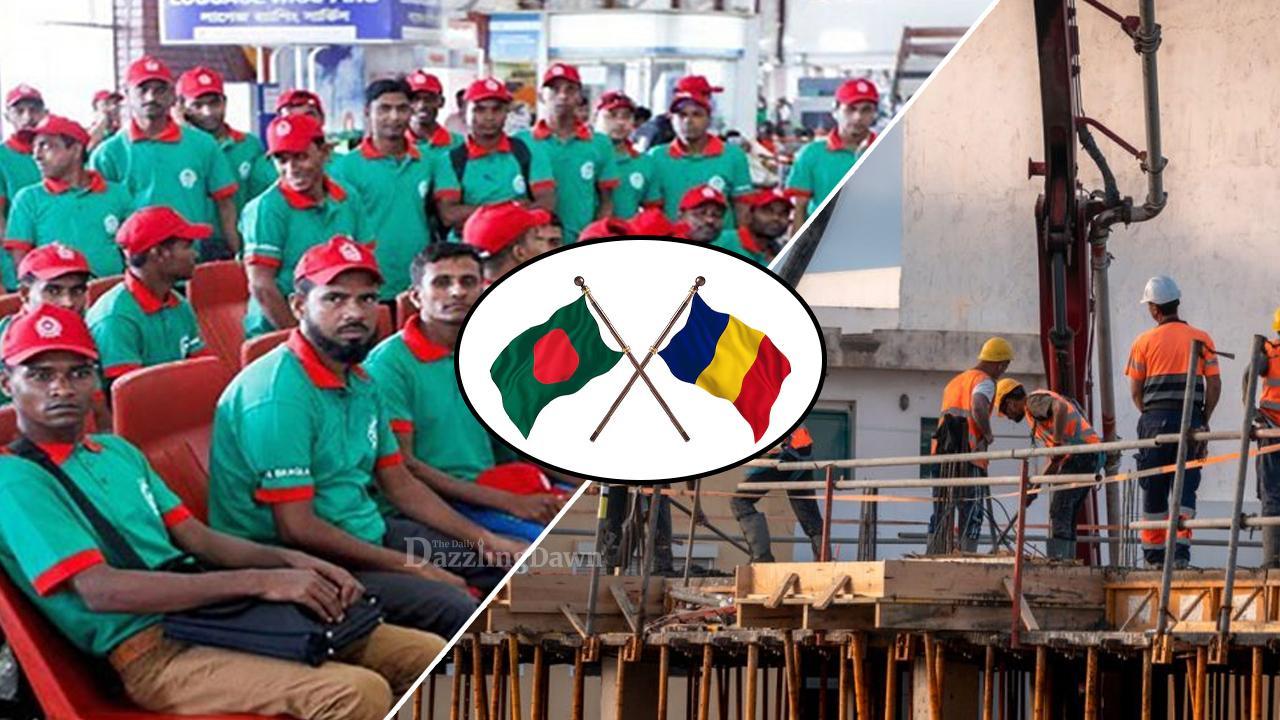Bangladesh should penetrate deeply into the labour market of Romania as a draft governmental ordinance allows the former European country to hire 140,000 employees outside the EU in Romania in 2024. This number is 40% higher than the existing limit of 100,000, which means that Romania needs even more workers from Asian countries, diplomatic sources in Dhaka and Bucharest said.
The labour market in Romania faces significant challenges, including an aging population, insufficient investment in workforce development, and significant emigration, the Bucharest Center for Economy & Society (CES Bucharest) said.
As the labour crisis deepens in the east European country, Romania's government has increased the quota of labour permits in case of non-EU residents to the tune of 140,000 in 2024 that was 100,000 in 2023. The decision was based on an estimated number of 500,000 vacancies. Until October 9, 2023, the government of Romania issued a total of 80,375 employment permits.
According to newspapers in Bucharest, the demand for highly specialised workers in Romania is expected to soar, with an estimated 624,000 additional positions needing to be filled by 2030, CES Bucharest said recently. However, only 1% of the population aged 25-64 participates in vocational training courses, compared to the European average of 9.1 per cent.
The demand for people with medium and low level of qualification will rise by more than 400,000 people by 2030, according to data reviewed by the think tank.
Additionally, the aging population is expected to triple the number of active people over 65 in the next decade, with a 10% increase in this demographic reducing gross domestic product (GDP) growth per capita by 5.5%.
Also, the labour market is witnessing a decline in the number of young active workers, with projections indicating a potential 3.5% decrease in the age group of 20-34 by 2035 compared to 2020 levels.
Migration is another significant factor impacting the labour market. Romania ranks 17th globally in terms of population migration, with over 5.7 million Romanians opting to work abroad.
Meanwhile, the European country imports labour, particularly from Asia, to meet workforce demands in sectors such as construction, hospitality, and retail……….…..
Meanwhile, the Romanian government issued 42,000 South Asian migrants work visas in 2023, according to the Romanian Border Police told InfoMigrants.
Meanwhile, Sri Lanka emerged as the top country on the list, with 11,429 Sri Lankans granted long-term work visas in 2023, reflecting a notable 56.2% increase from the previous year. This rise is attributed to an economic and political crisis in Sri Lanka, prompting citizens to seek opportunities abroad for a better life.
Bangladesh ranked second, with 11,138 Bangladeshi immigrants arriving in Romania with visas in 2023, marking a significant 27.5% increase from the preceding year. Some of that increase is fueled by political conflicts, accusations of authoritarian rule, climate change-induced displacement, and economic challenges exacerbated by the COVID-19 pandemic in Bangladesh.
Nepal stood at third place, with 9,715 Nepali citizens entering Romania on work visas in 2023. The numbers of Nepalese entering Romania in 2023 slightly decreased compared to data from the previous year.
There was a slight increase in the numbers of Pakistanis and Indians who entered Romania in 2023, compared to the numbers of those nationals entering in 2022.
When it comes to higher education, fewer students from South Asian countries chose Romania compared to those obtaining work visas. In 2023, only 829 people from South Asia arrived to study in Romania -- an increase by 14.3% compared to 2022, when 725 students arrived.
Among the students who entered Romania last year, there were 461 Bangladeshis, 185 Indians, 130 Pakistanis, 40 Sri Lankans, and 13 Nepali citizens. As of Immigration, 39000-40000 Bangladeshi citizens legally enters into Romania since 2020. Among them 10000+ are residing here. Rest have fled to west or south European countries
Not all people who received visas to work in Romania seem to stay in the country. There is a noticeable gap between the number of visa holders and the actual legal residents in the country. Romania's General Inspectorate for Immigration (IGI) reported to InfoMigrants via an email on January 16, that 18,871 Nepali citizens legally resided in Romania as of January 3 this year.
While talking to this correspondent, a Bangladesh diplomat in Bucharest said that most Bangladeshi workers residing in the middle-east usually come to Romania with an expectation of better lifestyles. But after arriving in the European country, a good number of them use Romania use this country to enter the western European country, causing irritation among stakeholders in Romania, said a Bangladeshi diplomat. The disparity between visa holders and legal residents is particularly evident among Bangladeshi nationals. Despite the large number of Bangladeshis receiving visas, the number of legal immigrants in Romania is considerably lower.
Nepalese and Sri Lankan workers are quite popular in Romania because they paid reasonable amount to the agent to come in Romania and in most of the cases they aren’t complaining against salary. On the other hand, Bangladeshis are paying the highest, 8,000-10000 Euro per person on an average, in the globe while the other nationals are paying 3000-4000 Euros maximum per person. Due to higher migration cost Bangladeshi workers aren’t happy with the existing salary and other advantages provided by the Romanian companies as their dreams are different about Europe. while Indian and Pakistani workers are also in the race to capture the labour market of the East European country…………
The Romanian authorities say they have detained individuals from Bangladesh, Nepal, and other nationalities attempting irregular border crossings into neighboring Hungary and Serbia. In 2023, 1,222 immigrants from various countries, including 397 Bangladeshis, were forcibly deported from Romania.
Meanwhile, Bangladesh’s export to Romania posted 214.32% per cent growth during the July-March period during 2023-24 fiscal year which is the highest as per EPB’s Mission-wise export. Bangladesh exported goods worth 122.95 million US dollars during July—March period of 2023-24 as against 39.72 million US dollars during July—March period of 2022-23 fiscal year.
Bangladesh exported goods worth 71.17 million US dollars during July-June period of the 2022-23 fiscal year. However, Bangladesh’s exports reached Romania through the third country –namely Turkey and Germany, sources said. Bangladesh has been working closely with stakeholders of Romania to send goods directly to the east European country that will help increase export earnings by 300.00-400.00 per cent.
Meanwhile, the then Romanian Ambassador to India, Nepal, and Bangladesh, Daniela Sezonov Tene, expressed concerns about Bangladeshi nationals mis-using work permit visas during a meeting with the Federation of Bangladesh Chambers of Commerce & Industries (FBCCI) delegation in Dhaka in December 2022.
After a decade of waiting, Romania will partially enter the Schengen zone -- a group of European countries that have largely abolished checks on their mutual borders -- from March 31 this year. To comply with Schengen regulations, Romania has intensified its border surveillance and its efforts to detain migrants attempting to enter Hungary -- the westward Schengen neighbor of Romania -- without the correct papers. However, Romania's and Bulgaria's entry into the free travel zone will only apply to sea and air -- meaning that checks will not be abolished at their land borders.
Romania’s workers market could be occupied by the majority of Bangladeshi workers if they would stay at least one (01) year in Romania. At the beginning in 2020-2021, the Romanian companies provided air ticket and work permit fee for the workers. Some Bangladeshi recruiting agents spoiled the market by inviting Romanian companies to issue more work permits paying 1000-2000 Euro per and to cancel the airfare. It turns out that a company that has capacity to employ 05 workers but issued 500 work permits by showing vacancy. In fact, five of these 500 people will find work, while the remaining 495 will have to leave or be persecuted and stay illegally in Romania. This is another reason of so called “Game” or “Dunki” [Illegal way of trans-border crossing].
If someone came to Romania and couldn't find a job, he had to become illegal before, but that situation is changing day by day due to the direct role of the diplomatic channels of the embassy. Romania now offers two-year temporary residence permits and may soon move to legalize illegal immigrants under pressure from South Asian and African embassies. The country was socialist before the 1990s, and after joining the European labor market, it has reformed many labor laws, and more reforms are needed. If a worker was cheated to come to his company and not get a job, it used to be a lot of trouble to get a job in another company, but nowadays, with all the efforts of the embassy's diplomatic channels, it is now easy to change jobs and the embassy has been able to convey the importance of the matter to the Romanian Ministry of Foreign Affairs, Immigration and Labor Directorate.
One thing that is often seen in Romania is that recruiters from Bangladesh bring workers to work; Upon arrival, it turns out that the worker knows nothing about the job and the Romanian owner is disappointed. For this reason, the people concerned are insisting on the penetration of skilled workers.
According to the Romanian Ministry of Education, more than 1000 Bangladeshi students have applied to study in Romanian universities this year. In 2020-21, where only two or three Bangladeshi students were studying, the interest of so many students to study in Romania in a span of two or three years is surprising, diplomatic channels say.
Meanwhile, the then Foreign Minister of Bangladesh, Dr AK Abdul Momen, in December 2022, said that Romania will recruit one lakh foreign workers including Bangladeshis, mostly for the construction sector.
"People started going to Romania from 2021. Over one lakh, mostly construction workers, will be hired next year. It's good news for Bangladesh too. As like before, they [Romania] will open a temporary consulate office here to recruit from Bangladesh," he told journalists.
Following bilateral consultation between the ministers for foreign affairs of the two countries in October 2021, Romania agreed to open a temporary consular office in Dhaka.
Earlier in 1975, Bangladesh opened its first mission in Romania but it was shut down in 1995, while Romania closed its mission in Bangladesh in 2000. Bangladesh has reopened its embassy recently.
"Earlier Bangladeshis had to go to India to get Romanian visas. With the efforts of our government, Romania opened a temporary consular office in Dhaka, and our workers are benefiting from it," Md Shahidul Alam, the then director general of the Bureau of Manpower, Employment and Training (BMET), said in 2022.
Meanwhile, foreign citizens need a work permit to work in Romania unless they are from the European Union (EU). Any non-EU citizens will need to apply before they can find work in Romania.
"There are several types of work permits that can be granted to foreign citizens: for permanent workers, seasonal workers, for trainees, for athletes, for cross-border workers, nominal work permit. Depending on the category of your activity, the right to extend your temporary stay for employment purposes can be extended up to 1 year, as a general rule. As far as highly skilled workers are concerned, their stay can be extended up to 2 years," explains a Romanian government website.
An employer needs to initiate the steps necessary for a foreigner to gain a work permit and pay the applicable taxes. It takes up to 30 days to process requests. But then so many people applied to work in the eastern EU country that the authorities admitted they were finding it hard to process all applications in time.
Foreign citizens need a work permit to work in Romania unless they are from the European Union (EU). Any non-EU citizens will need to apply before they can find work in Romania.
But then so many people applied to work in the eastern EU country that the authorities admitted they were finding it hard to process all applications in time.








.svg)

